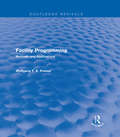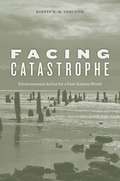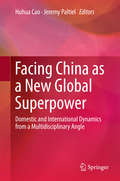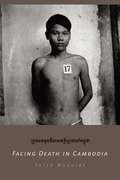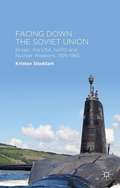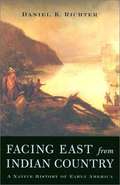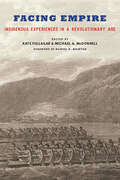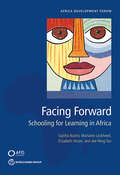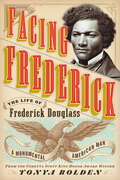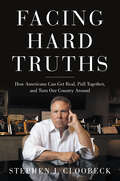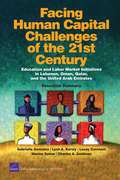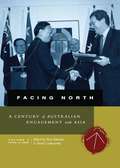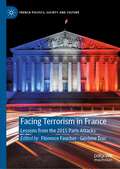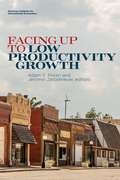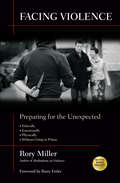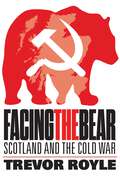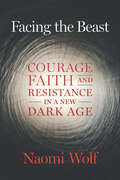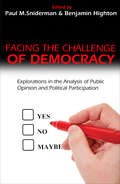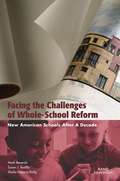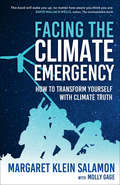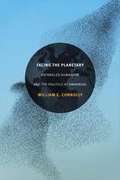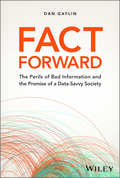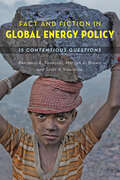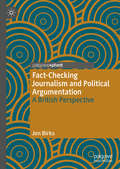- Table View
- List View
Facility Programming: Methods and Applications (Routledge Revivals)
by Wolfgang F. PreiserFirst published in 1978, the objective of this book is to provide an authoritative and selective overview of current, user-orientated programming methods within the field of environmental design. The 19 chapters compiled in this volume describe procedures and the information content of innovative approaches used by leading programming experts in the private and institutional sectors. Emphasis is placed on a qualitative and illustrative focus of selected approaches to environmental programming with the eventual occupants in mind. The chapter groupings are intended to reflect three major areas of professional engagement that serve the field of facility programming. The first group describe the approaches of firms or groups that were organised exclusively to provide environmental analysis and programming services. Part II is composed of chapters by authors who belong to established architectural firms with programming departments and Part III presents evidence that pertains to the supporting role of research and guidance literature from authors primarily affiliated with government agencies or supported by large organisations.
Facing Catastrophe: Environmental Action for a Post-Katrina World
by Robert R. VerchickAs Hurricane Katrina vividly revealed, disaster policy in the United States is broken and needs reform. What can we learn from past disasters—storms, floods, earthquakes, tsunamis, landslides, and wildfires—about preparing for and responding to future catastrophes? How can these lessons be applied in a future threatened by climate change? In this bold contribution to environmental law, Robert Verchick argues for a new perspective on disaster law that is based on the principles of environmental protection. His prescription boils down to three simple commands: Go Green, Be Fair, and Keep Safe. “Going green” means minimizing exposure to hazards by preserving natural buffers and integrating those buffers into artificial systems like levees or seawalls. “Being fair” means looking after public health, safety, and the environment without increasing personal and social vulnerabilities. “Keeping safe” means a more cautionary approach when confronting disaster risks. Verchick argues that government must assume a stronger regulatory role in managing natural infrastructure, distributional fairness, and public risk. He proposes changes to the federal statutes governing environmental impact assessments, wetlands development, air emissions, and flood control, among others. Making a strong case for more transparent governmental decision-making, Verchick offers a new vision of disaster law for the next generation.
Facing China as a New Global Superpower
by Huhua Cao Jeremy PaltielThis book brings together diverse perspectives from the newest generation of scholars from Canada and China to better understand China in the 21st century. It examines China's socio-political structure, its particular relationship with Canada, and interaction with the international community; and discusses how to overcome the ideological differences between the two countries to establish positive and sustainable Canada-China bilateral relations for the future. Importantly, the perspectives are from young authors, with a different relationship to China (and Canada) than more established authors. This compilation helps breathe new life into the study of Sino-Canada relations from both countries, and to reassess and re-frame issues related to China in the 21st century.
Facing Death in Cambodia
by Peter MaguireThis book is the story of Peter Maguire's effort to learn how Cambodia's "culture of impunity" developed, why it persists, and the failures of the "international community" to confront the Cambodian genocide. Written from a personal and historical perspective, Facing Death in Cambodia recounts Maguire's growing anguish over the gap between theories of universal justice and political realities. Maguire documents the atrocities and the aftermath through personal interviews with victims and perpetrators, discussions with international officials, journalistic accounts, and government sources.
Facing Death in Cambodia
by Peter MaguireThe Khmer Rouge regime took control of Cambodia by force of arms, then committed the most brazen crimes since the Third Reich: at least 1.5 million people murdered between 1975 and 1979. Yet no individuals were ever tried or punished. This book is the story of Peter Maguire's effort to learn how Cambodia's "culture of impunity" developed, why it persists, and the failures of the "international community" to confront the Cambodian genocide. Written from a personal and historical perspective, Facing Death in Cambodia recounts Maguire's growing anguish over the gap between theories of universal justice and political realities.Maguire documents the atrocities and the aftermath through personal interviews with victims and perpetrators, discussions with international and NGO officials, journalistic accounts, and government sources gathered during a ten-year odyssey in search of answers. The book includes a selection of haunting pictures from among the thousands taken at the now infamous Tuol Sleng prison (also referred to as S-21), through which at least 14,000 men, women, and children passed—and from which fewer than a dozen emerged alive.What he discovered raises troubling questions: Was the Cambodian genocide a preview of the genocidal civil wars that would follow in the wake of the Cold War? Is international justice an attainable idea or a fiction superimposed over an unbearably dark reality? Did issues of political expediency allow Cambodian leaders to escape prosecution?The Khmer Rouge violated the Nuremberg Principles, the United Nations Charter, the laws of war, and the UN Genocide Convention. Yet in the decade after the regime's collapse, the perpetrators were rescued and rehabilitated-even rewarded-by China, Thailand, the United States, and the UN. According to Peter Maguire, Cambodia holds the key to understanding why recent UN interventions throughout the world have failed to prevent atrocities and to enforce treaties.
Facing Down The Soviet Union: Britain, The Usa, Nato And Nuclear Weapons, 1976-1983
by Kristan StoddartFacing East from Indian Country: A Native History of Early America
by Daniel K. RichterIn the beginning, North America was Indian country. But only in the beginning. After the opening act of the great national drama, Native Americans yielded to the westward rush of European settlers. Or so the story usually goes. Yet, for three centuries after Columbus, Native people controlled most of eastern North America and profoundly shaped its destiny. In Facing East from Indian Country, Daniel K. Richter keeps Native people center-stage throughout the story of the origins of the United States. Viewed from Indian country, the sixteenth century was an era in which Native people discovered Europeans and struggled to make sense of a new world. Well into the seventeenth century, the most profound challenges to Indian life came less from the arrival of a relative handful of European colonists than from the biological, economic, and environmental forces the newcomers unleashed. Drawing upon their own traditions, Indian communities reinvented themselves and carved out a place in a world dominated by transatlantic European empires. In 1776, however, when some of Britain's colonists rebelled against that imperial world, they overturned the system that had made Euro-American and Native coexistence possible. Eastern North America only ceased to be an Indian country because the revolutionaries denied the continent's first peoples a place in the nation they were creating. In rediscovering early America as Indian country, Richter employs the historian's craft to challenge cherished assumptions about times and places we thought we knew well, revealing Native American experiences at the core of the nation's birth and identity.
Facing Empire: Indigenous Experiences in a Revolutionary Age
by Kate Fullagar and Michael A. McDonnellA comprehensive volume that interrogates European imperialism from the perspective of indigenous experiences.The contributors to Facing Empire reimagine the Age of Revolution from the perspective of indigenous peoples. Rather than treating indigenous peoples as distant and passive players in the political struggles of the time, this book argues that they helped create and exploit the volatility that marked an era while playing a central role in the profound acceleration in encounters and contacts between peoples around the world. Focusing in particular on indigenous peoples’ experiences of the British Empire, this volume takes a unique comparative approach in thinking about how indigenous peoples shaped, influenced, redirected, ignored, and sometimes even forced the course of modern imperialism. The essays demonstrate how indigenous-shaped local exchanges, cultural relations, and warfare provoked discussion and policymaking in London as much as it did in Charleston, Cape Town, or Sydney. Facing Empire charts a fresh way forward for historians of empire, indigenous studies, and the Age of Revolution and shows why scholars can no longer continue to exclude indigenous peoples from histories of the modern world. These past conflicts over land and water, labor and resources, and hearts and minds have left a living legacy of contested relations that continue to resonate in contemporary politics and societies today. Covering the Indian and Pacific Oceans, Australia, and West and South Africa, as well as North America, this book looks at the often misrepresented and underrepresented complexity of the indigenous experience on a global scale.Contributors: Tony Ballantyne, Justin Brooks, Colin G. Calloway, Kate Fullagar, Bill Gammage, Robert Kenny, Shino Konishi, Elspeth Martini, Michael A. McDonnell, Jennifer Newell, Joshua L. Reid, Daniel K. Richter, Rebecca Shumway, Sujit Sivasundaram, Nicole Ulrich
Facing Forward: Schooling for Learning in Africa (Africa Development Forum)
by Sajitha Bashir Tan Marlaine Lockheed Elizabeth NinanWhile everybody recognizes the development challenges facing Sub-Saharan Africa, few have put together coherent plans that offer real hope for any feasible and general improvement. Facing Forward combines an evidence-based plan that not only recognizes the deep problems but provides specific prescriptions for dealing with the problems. In the simplest version, focus on the skills of the people and do it in a rational and achievable manner. †“ Eric Hanushek, Paul and Jean Hanna Senior Fellow, Hoover Institute, Stanford University This book offers a clear perspective on how to improve learning in basic education in Sub- Saharan Africa, based on extremely rigorous and exhaustive analysis of a large volume of data. The authors shine a light on the low levels of learning and on the contributory factors. They have not hesitated to raise difficult issues, such as the need to implement a consistent policy on the language of instruction, which is essential to ensuring the foundations of learning for all children. Using the framework of “From Science to Service Delivery,†? the book urges policy makers to look at the entire chain from policy design, informed by knowledge adapted to the local context, to implementation. Facing Forward: Schooling for Learning in Africa is a unique addition to the literature that is relevant for African policy makers and stakeholders. †“ Professor Hassana Alidou, Ambassador of the Republic of Niger to the United States and Canada As the continent gears itself up to provide universal basic education to all its children by 2030, it has to squarely address the challenge of how to improve learning. Facing Forward helps countries to benchmark themselves against each other and to identify concrete lines of action. It forces policy makers to think “where do I go from here?†? “what do I do differently?†? and to examine the hierarchy of interventions that can boost learning. It rightly urges Ministries of Education to build capacity through learning by doing and continuous adaptation of new knowledge to the local context. Facing Forward will unleash frank conversations about the profound reforms that are required in education policy and service delivery to ensure learning for every child on the continent. †“ Dr. Fred Matiang’I, Cabinet Secretary for the Interior and Coordination of National Government, Government of Kenya (former Cabinet Secretary for Education) Facing Forward couldn’t have come at a more opportune time as countries in the region, including Mauritius, focus more on learning outcomes rather than simply on inputs and processes in education systems. The book underscores the important point that African countries need not exclusively model themselves on high-performing education systems in the world. Much can as well be learnt from other countries at the same level of development, or lower, by virtue of the challenges they have faced and successfully overcome. This presents opportunities for greater peer-sharing and networking with these countries. Indeed a number of key focus areas are highlighted in the book that demonstrate good practices worthy of being emulated. These cover domains as diverse as enabling factors leading to improved student progression, strengthened teacher capacity, increased budgetary allocation with a focus on quality, as well as improved technical capacity of implementing agencies in the region. †“ Hon. (Mrs.) Leela Devi Dookun-Luchoomun, Minister of Education and Human Resources, Tertiary Education and Scientific Research, Republic of Mauritius
Facing Frederick: The Life of Frederick Douglass, A Monumental American Man
by Tonya BoldenThe fascinating biography of one of America’s most influential African American voices from the award–winning author of Speak Up, Speak Out!Teacher. Self-emancipator. Orator. Author. Man. Frederick Douglass (1818–1895) is one of the most important African American figures in US history, best known, perhaps, for his own emancipation. But there is much more to Douglass’s story than his time spent in slavery and his famous autobiography. Delving into his family life and travel abroad, this book captures the whole complicated, and at times perplexing, person that he was. As a statesman, suffragist, writer, newspaperman, and lover of the arts, Douglass the man, rather than the historical icon, is the focus in Facing Frederick.“Most folks know Frederick Douglass as an escaped slave turned abolitionist. Bolden’s insightful, and impeccably researched, biography reveals, instead, a multifaceted man who would travel many paths and constantly redefine himself . . . Bolden’s beautiful, sophisticated narrative demonstrates that throughout all of his responsibilities, Douglass never lost sight of his biggest role—humanitarian.” —Booklist (starred review)“This narrative about a well-known figure feels fresh due to Bolden’s skilled storytelling . . . A spirited biography that fully honors its redoubtable subject.” —Kirkus Reviews (starred review)“Bolden successfully demonstrates in this biography how monumental a figure Frederick Douglass is in U.S. history . . . Bolden adroitly demonstrates the wealth of Douglass’s life and accomplishments with this stellar biography. A must for all nonfiction collections.” —School Library Journal (starred review)“An excellent biography.” —School Library Connection
Facing Hard Truths: How Americans Can Get Real, Pull Together, and Turn Our Country Around
by Stephen J. Cloobeck"It's a great book and he should be proud of it." —President Bill Clinton Successful businessman, activist, and philanthropist, and 2026 candidate for governor of California Stephen J. Cloobeck applies an unflinching problem-solver's eye to America's most pervasive challenges. Cloobeck built his reputation transforming dysfunctional companies at the brink of ruin into performance powerhouses. In Facing Hard Truths, he focuses this proven business acumen on our most pressing concerns like immigration, crime, the cost of living, and the coarsening of political discourse. He offers sometimes tough—but always sincere—lessons learned over a lifetime of public and private sector experience. From his first job bussing tables in a small California restaurant, to his time operating a global hospitality juggernaut, to helming federal public-private partnerships, state agencies, and local organizations, Cloobeck's journey propelled him from busboy to boardroom. In this book, he relies on the action-oriented principles that drove his personal success to outline a plan that will take California, and America, from flailing back to flourishing. With a refusal to pander and a no-nonsense assessment of today's most salient issues, Cloobeck argues our country's ability to effectively navigate the future depends on a reaffirmed commitment to: Integrity Collaboration Respect for rules and norms Economic inclusivity A return to competence Putting others first Fostering of social trust In Facing Hard Truths, Cloobeck's engaging storytelling and straight-shooting proposals leave readers feeling heard, respected, and above all, eager to set aside political differences and get back to what really matters: creating an America that is more affordable, liveable, and opportunity-rich for all.
Facing Human Capital Challenges of the 21st Century: Executive Summary
by Lynn A. Karoly Louay Constant Charles A. Goldman Gabriella C. Gonzalez Hanine SalemSummarizes the education and labor market initiatives implemented or under way in four countries in the Arab region--Lebanon, Oman, Qatar, and the United Arab Emirates--to address the human resource issues they each face as they prepare their countries for a place in the 21st century global economy. Together, these countries highlight the variety of challenges faced by countries in the region and responses to those challenges.
Facing North Volume 2: 1970s To 2000
by Peter Edwards David GoldsworthyFacing North is the first substantial history of Australia's relations with Asia since Federation. Volume 1 (2001) chronicles Australian-Asian relations from 1901 to the 1970s. Volume 2 now carries the story through the last decades of the century. Both make extensive use of official government sources and of the private collections of ministers and public servants. This volume discusses the changing relations between Australia and Asia in the period from the 1970s to 2000. Over this time, integration became a dominant theme as Australia looked increasingly to its near neighbours to form political, social and economic alliances. An important driving force behind this direction was the economic opportunities presented by Asia. At the same time, Australia championed the rights of Asian countries to self-determination, economic development and an independent role in international affairs. The book combines the discussion of broad policy themes with detailed analysis of policy-making in relation to particular issues such as human rights, and episodes such as the crisis in East Timor. At home, a key concern was the question of difference between Australian and Asian values. As Australia began accepting significant numbers of immigrants from the region, the country's national identity, and the extent to which it identified with Asia, became matters of intense debate. Australian society itself has changed as a result. Facing North is essential reading for anyone who wants to better understand Australia's present relations with Asian countries, and our future choices.
Facing Terrorism in France: Lessons from the 2015 Paris Attacks (French Politics, Society and Culture)
by Gérôme Truc Florence FaucherFrom 2015, Europe was hit by a new wave of terrorist attacks, coordinated or supported by an international Islamist organization (ISIS) but sometimes also perpetrated by citizens of the targeted country: the attacks on Paris, Brussels, London, Manchester, Nice and Barcelona probably attracted most attention but the most dramatic were perpetrated in Paris, in January and November 2015. These events shook the foundations of French society not only because of their magnitude but also because of the symbolic nature of the targets. Whilst in January, the targets were carefully selected as emblematic of France (the satirical weekly Charlie Hebdo, the police forces, the Jewish community) and of European liberal values (journalists and cartoonists), in November the victims ordinary people enjoying music, sports and restaurants. The book offers a unique interdisciplinary investigation into the complex responses of French society: from the individual level (survivors of the Bataclan attack, emotional citizens paying homage to the victims, French Muslims) to the meso level of civic association and web communities, and the macro level of the State and public opinion.
Facing Up to Low Productivity Growth
by Jeromin Zettelmeyer Adam S. PosenLabor productivity growth in the United States and other advanced countries has slowed dramatically since the mid-2000s, a major factor in their economic stagnation and political turmoil. Economists have been debating the causes of the slowdown and possible remedies for some years. Unaddressed in this discussion is what happens if the slowdown is not reversed.In this volume, a dozen renowned scholars analyze the impact of sustained lower productivity growth on public finances, social protection, trade, capital flows, wages, inequality, and, ultimately, politics in the advanced industrial world. They conclude that slow productivity growth could lead to unpredictable and possibly dangerous new problems, aggravating inequality and increasing concentration of market power. Facing Up to Low Productivity Growth also proposes ways that countries can cope with these consequences.
Facing Violence: Preparing for the Unexpected
by Rory MillerThis book stands alone as an introduction to the context of self-defense. There are seven elements that must be addressed to bring self-defense training to something approaching 'complete.' Training that dismisses any of these areas leaves you vulnerable: Legal and ethical implications. To learn self-defense, you must learn force law. The consequence is prison. Side by side with the legal rules, everyone must explore his or her own ethical limitations. Most people don't really know where this ethical line lies within them. Violence dynamics. Self-defense must teach how attacks happen. You must be able to recognize an attack before it happens and know what kind you are facing. Avoidance. You need to learn and practice not-fighting. Learning includes escape and evasion, verbal de-escalation, and also pure not-be-there avoidance. Counter-ambush. If you didn't see the precursors or couldn't successfully avoid the encounter, you will need a handful of actions, trained to reflex level, to deal with a sudden violent attack. Breaking the freeze. Freezing is almost universal in a sudden attack. You must learn to recognize a freeze and break out of one. The fight itself. Most martial arts and self-defense instructors concentrate their time on the fight. It just needs to be in line with how violence really happens in the world. The aftermath. There are potential legal, psychological, and medical effects of engaging in violence no matter how justified. Advanced preparation is critical.
Facing the Bear: Scotland and the Cold War
by Trevor RoyleThe author of Culloden explores Scotland&’s history during the Cold War. Between the end of the Second World War and the collapse of Communism, confrontation with the Soviet Union was an everyday reality. As part of NATO&’s response, Scotland played a key role in the alliance&’s forward maritime defense strategy, aimed at containing the Soviet threat from naval and air forces. During this period, 10 percent of the UK&’s naval and air forces were based in Scotland, and there was a substantial U.S. presence, as well as top secret satellite and command stations. In Facing the Bear, Trevor Royle paints a fascinating portrait of this extraordinary period, examining not just the wider military and political contexts, but also showing how the defense industry brought huge economic benefits, how CND maintained a high-profile presence, and how anti-nuclear sentiments underpinned much of the left&’s thinking in Scotland and contributed to the hegemony enjoyed by the Labour Party in Scotland during the Cold War.Praise for Facing the Bear&“Engrossing . . . . Like a military commander at the top of his game, Royle marshals his material to maximum effect to show how Scotland has been shaped by, and also helped shape, the Cold War . . . . He ranges far and wide and has that rare talent to marry the local with the geopolitical . . . . But this is not simply a story of military hardware and confrontation. Royle is very interesting on how the Cold War influenced our cultural life from the novel to poetry and the protest song.&” —Barclay McBain, The Herald (UK)
Facing the Beast: Courage, Faith, and Resistance in a New Dark Age
by Naomi WolfFrom New York Times bestselling author Naomi Wolf, Facing the Beast is a devastating, detailed account of wrongthink, deplatforming, and an unexpected political, personal, and spiritual transformation that followed during one of the most divisive times in American history.In this uncompromising investigation into today&’s most urgent issues, Naomi Wolf uses her own wildly politicized pilgrimage—from New York Times bestselling author and high-level Democratic consultant to a journalist cast out from the elite political and social circles she once moved through—as a stunning narrative framework that is both chilling and incisive.Wolf&’s sin? Doing the job that good journalists once prided themselves on: asking questions, challenging authority, and, during one of the most politically divisive moments in modern history, exposing the many failures of the public health response during the COVID-19 pandemic by chronicling the dangerous descent of our democracy into tyranny, censorship, and totalitarianism.Unable to remain silent in the shadows and unwilling to collude with the mainstream, Wolf bravely covers topics that few other writers dare to address critically for fear of being deplatformed. Facing the Beast explores reproductive rights, medical freedom, the uncurious thought-policing of the &“progressive&” left, the Second Amendment, the criminal relationship between the FDA and Pfizer—Wolf&’s clear writing repeatedly shines light in the dark corners of our fractured society.A decades-long champion of free speech, freedom of the press, and the Constitution, Wolf found herself not only in the midst of a political rebirth but a spiritual transformation as well—one in which the events of the day could only be described in terms of good, evil, and a metaphysical quest on the nature of reality.For readers of Matt Taibbi, Glenn Greenwald, and Bari Weiss, Facing the Beast is a fearless indictment of legacy media and the political class, as well as a brutal reminder that searching for and defending the truth can be dangerous.&“Naomi Wolf is one of the bravest, clearest-thinking people I know. The reason you hear the forces of repression so desperately trying to dismiss her is because she is right.&”—Tucker Carlson
Facing the Challenge of Democracy: Explorations in the Analysis of Public Opinion and Political Participation
by Paul M. Sniderman Benjamin HightonCitizens are political simpletons--that is only a modest exaggeration of a common characterization of voters. Certainly, there is no shortage of evidence of citizens' limited political knowledge, even about matters of the highest importance, along with inconsistencies in their thinking, some glaring by any standard. But this picture of citizens all too often approaches caricature. Paul Sniderman and Benjamin Highton bring together leading political scientists who offer new insights into the political thinking of the public, the causes of party polarization, the motivations for political participation, and the paradoxical relationship between turnout and democratic representation. These studies propel a foundational argument about democracy. Voters can only do as well as the alternatives on offer. These alternatives are constrained by third players, in particular activists, interest groups, and financial contributors. The result: voters often appear to be shortsighted, extreme, and inconsistent because the alternatives they must choose between are shortsighted, extreme, and inconsistent. Facing the Challenge of Democracy features contributions by John Aldrich, Stephen Ansolabehere, Edward Carmines, Jack Citrin, Susanna Dilliplane, Christopher Ellis, Michael Ensley, Melanie Freeze, Donald Green, Eitan Hersh, Simon Jackman, Gary Jacobson, Matthew Knee, Jonathan Krasno, Arthur Lupia, David Magleby, Eric McGhee, Diana Mutz, Candice Nelson, Benjamin Page, Kathryn Pearson, Eric Schickler, John Sides, James Stimson, Lynn Vavreck, Michael Wagner, Mark Westlye, and Tao Xie.
Facing the Challenges of Whole-School Reform
by Susan J. Bodilly Sheila Nataraj Kirby Mark BerendsAbout a decade ago, New American Schools (NAS) set out to address theperceived lagging performance of American students and the lacklusterresults of school reform efforts. As a private nonprofit organization,NAS's mission was-and is-to help schools and districts raise studentachievement levels by using whole-school designs and design team assistanceduring implementation. Since its inception, NAS has engaged in adevelopment phase (1992-1993), a demonstration phase (1993-1995), and ascale-up phase (1995-present). Over the last ten years, RAND has been monitoring the progress of the NASinitiative. This book is a retrospective on NAS and draws together thefindings from RAND research. The book underscores the significantcontributions made by NAS to comprehensive school reform but also highlightsthe challenges of trying to reform schools through whole-school designs.Divided into sections on each research phase, the book concludes with anafterword by NAS updating its own strategy for the future. This book willinterest those who want to better understand comprehensive school reform andits effects on teaching and learning within high-stakes accountabilityenvironments.
Facing the Climate Emergency: How to Transform Yourself with Climate Truth
by Molly Gage Margaret Klein SalamonStop fretting and start fighting global warming: “A remarkable account of how you can become a climate warrior.” —Bill McKibben, founder of 350.orgYes, we’re facing catastrophic breakdown of our climate. Yes, it’s terrifying. But you don’t have to be paralyzed. You can use your pain to transform yourself, your friends, and the world. You can become the hero humanity needs. This book will show you how.Facing the Climate Emergency is an action-oriented self-help guide showing you how to maximize your potential to meet the greatest challenge humanity has ever faced. Written for all of us struggling to cope and wanting to do something to stop the climate crisis, it gives us the blueprint to leave “normal” behind and enter climate “emergency mode.”How to face the climate crisis and accept your fears, anger, grief, guilt, and other emotionsTurning negative feelings into tangible action to respond to the crisisRising to heroism and maximizing your impact by joining the Climate Emergency MovementInformation on further reading, questions for self-reflection, and exercises “This book will wake you up, no matter how aware you think you are.” —David Wallace-Wells, #1 New York Times-bestselling author of The Uninhabitable Earth
Facing the Planetary: Entangled Humanism and the Politics of Swarming
by William E. ConnollyIn Facing the Planetary William E. Connolly expands his influential work on the politics of pluralization, capitalism, fragility, and secularism to address the complexities of climate change and to complicate notions of the Anthropocene. Focusing on planetary processes—including the ocean conveyor, glacier flows, tectonic plates, and species evolution—he combines a critical understanding of capitalism with an appreciation of how such nonhuman systems periodically change on their own. Drawing upon scientists and intellectuals such as Lynn Margulis, Michael Benton, Alfred North Whitehead, Anna Tsing, Mahatma Gandhi, Wangari Maathai, Pope Francis, Bruno Latour, and Naomi Klein, Connolly focuses on the gap between those regions creating the most climate change and those suffering most from it. He addresses the creative potential of a "politics of swarming" by which people in different regions and social positions coalesce to reshape dominant priorities. He also explores how those displaying spiritual affinities across differences in creed can energize a militant assemblage that is already underway.
Fact Forward: The Perils of Bad Information and the Promise of a Data-Savvy Society
by Dan GaylinSolutions to increase trust and empower better decision making in a data-rich world Fact Forward: The Perils of Bad Information and the Promise of a Data-Savvy Society explores how a growing deluge of data has led to a data-rich world with abundant new opportunities and a precipitous decline in trust due to the problems we face in producing, communicating, and consuming data. This book takes readers on a journey through the data ecosystem, showing how data producers, data consumers, and data disseminators all have a role to play in creating a more data-savvy society. Written by Dan Gaylin, president and CEO of NORC at the University of Chicago, a leading research organization in the field of social science and data science, this book demonstrates the urgent need for: greater transparency on the part of data producers increased data literacy on the part of data communicators and data consumers a societal commitment to data education and infrastructure Fact Forward: The Perils of Bad Information and the Promise of a Data-Savvy Society earns a well-deserved spot on the bookshelves of leaders across industries and all individuals who want to build a better society and world by improving the way we present, analyze, and make use of data.
Fact and Fiction in Global Energy Policy: Fifteen Contentious Questions
by Benjamin K. Sovacool Marilyn A. Brown Scott V. ValentineA balanced examination of global energy issues.Energy sustainability and climate change are two of the greatest challenges facing humankind. Unraveling these complex and interconnected issues demands careful and objective assessment. Fact and Fiction in Global Energy Policy aims to change the prevailing discourse by examining fifteen core energy questions from a variety of perspectives, demonstrating how, for each of them, no clear-cut answer exists.Is industry the chief energy villain? Can we sustainably feed and fuel the planet at the same time? Is nuclear energy worth the risk? Should geoengineering be outlawed? Touching on pollution, climate mitigation and adaptation, energy efficiency, government intervention, and energy security, the authors explore interrelated concepts of law, philosophy, ethics, technology, economics, psychology, sociology, and public policy.This book offers a much-needed critical appraisal of the central energy technology and policy dilemmas of our time and the impact of these on multiple stakeholders.
Fact-Checking Journalism and Political Argumentation: A British Perspective
by Jen BirksThis timely book examines the role of fact-checking journalism within political policy debates, and its potential contribution to public engagement. Understanding facts not to operate in a political vacuum, the book argues for a wide remit for fact-checking journalism beyond empirically-checkable facts, to include the causal relationships and predictions that form part of wider political arguments and are central to electoral pledges. Whilst these statements cannot be proven or disproven, fact-checking can, and sometimes does, ask pertinent critical questions about the premises of those claims and arguments. The analysis centres on the three dedicated national British fact-checkers during the UK’s 2017 snap general election, including their activity and engagement on Twitter. The book also makes a close political discourse and argumentation analysis of three key issue debates in flagship reporting from Channel 4 News and the BBC.
